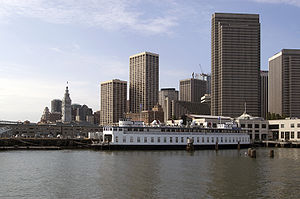Ferryboat Santa Rosa

| |
| Career | |
|---|---|
| Name: |
|
| Owner: |
|
| Operator: |
|
| Port of registry: |
1940: |
| Builder: | General Engineering & Dry Dock Company, Alameda, California |
| Yard number: | 6 |
| Completed: | June 1927 |
| In service: | 1927 |
| Refit: | 1941 |
| Out of service: | 1968 |
| Refit: | 1989 |
| Identification: |
Official Number: 226599 Call Sign: WA4715[1] |
| Status: | serves as banquet facility and office space |
| General characteristics (as built) | |
| Class and type: | Steel Electric Class auto/passenger ferry |
| Tonnage: | 2,465 GRT |
| Length: | 256 ft (78 m) |
| Beam: | 46 ft 6 in (14.17 m) |
| Propulsion: | 2 × Diesel-Electric engines, 2,400 horsepower (1,800 kW) |
| Speed: | 12 knots (22 km/h) |
| Capacity: |
616 passengers 59 vehicles |
| General characteristics (after 1941 refit) | |
| Type: | single ended auto/passenger ferry |
| Length: | 256 ft (78 m) |
| Beam: | 66 ft (20.1 m) |
| Draft: | 12 ft 9 in (3.9 m) |
| Deck clearance: | 12 ft (3.7 m) |
| Propulsion: | 1 × direct-drive Busch-Sulzer diesel, 2,800 horsepower (2,100 kW) |
| Speed: | 15 knots (28 km/h) |
| Capacity: |
1,500 passengers 90 vehicles[1] |
| General characteristics (after 1989 refit) | |
| Notes: | restored to original 1927 external appearance, deck converted to banquet facility and offices |
| Capacity: | 500 passengers[2] |
Santa Rosa was a Steel Electric Class ferry built in Alameda, California, for Northwestern Pacific Railroad. She started out serving Southern Pacific Railways on their Golden Gate Ferries line on San Francisco Bay.
She was purchased by the Puget Sound Navigation Company in 1940, and moved to Puget Sound. Puget Sound Navigation Company, believing that a single ended ferry would be more economical and faster, replaced her engines and converted her to a single-ended ferry, effectively making her no longer a true Steel Electric Class ferry. She was also renamed the MV Enetai, which is the name she kept when she was later acquired by Washington State Ferries who took over operations in 1951.[1] The ferry was returned to San Francisco after her sale in 1968, but sat largely unused until purchased by Hornblower Cruises in 1989. Hornblower restored her aft wheelhouse in an attempt to make her look like her original profile from 1927, however the passenger cabin retained the remodeled outline from her conversion to a single ender back in 1941.[3] She is currently moored at Pier 3 in San Francisco, where she serves both as office space and as a rental facility.[2]
References
- ↑ 1.0 1.1 1.2 The Enetai: A Graceful Retirement, evergreenfleet.com
- ↑ 2.0 2.1 Hornblower Cruises & Events
- ↑ History of Hornblower Yachts
| This ferry article is a stub. You can help Ship Spotting World by expanding it. |
